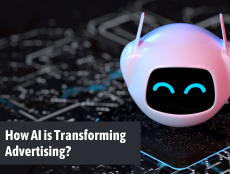As a business owner, you might constantly be looking for ways to grab the attention of your target audiences. And one tool that is really making a difference in the world of marketing is artificial intelligence (AI).
After tons of AI tools have arrived in the market, the partnership between artificial intelligence (AI) and advertising has brought about a fresh wave of innovation.
Today, top agencies and brands have swiftly discovered new uses for generative AI. A recent survey by Basis found that most marketing and advertising professionals, precisely 72%, utilize generative AI tools in their digital marketing and advertising work.
Read more: Key Considerations For Marketers When Implementing AI Technology
These professionals embrace this technology for various purposes, including content creation, research, and personalization. The initial wave of early adopters could set off a chain reaction, paving the way for a future of marketing that AI heavily influences.
In this blog, we will closely examine how advertising has evolved with the help of AI. We’ll explore how AI has influenced advertising, including its impact on personalization and automation. Additionally, we’ll discuss how AI has the potential to transform the advertising industry as we currently understand it completely.

What Is The Impact Of AI on Advertising, And How Can Advertisers Take Advantage Of AI?
The application of artificial intelligence (AI) in advertising has led to the disruption of traditional techniques and the introduction of ground-breaking new approaches to engaging and resonating with audiences. The following are some of the ways that AI is affecting advertising:
1. Personalization: Tailoring Content to Individuals
Algorithms powered by AI do in-depth analyses of user behavior, preferences, and demographics, allowing marketers to provide highly customized messages. Whether making product recommendations based on past purchases or selecting relevant adverts, AI helps companies interact with their target customers more meaningfully.
2. Automation: Streamlining Marketing Campaigns
AI makes the marketing process more efficient by automating operations that formerly required a lot of manual labor and time. Tools fueled by AI can plan, post, and even optimize content for maximum interaction across a variety of channels, including email campaigns and social media postings. This helps save time and guarantees that communication will be consistent across all platforms.
Read more: How AI Can Strengthen Social Media Marketing And Maximize ROI?
3. Predictive Analytics: Anticipating Consumer Behavior
Using AI-powered predictive analytics, advertisers may acquire insights into future customer patterns and behaviors. Artificial intelligence discovers trends by analyzing enormous datasets, enabling marketers to make intelligent decisions on product development, content strategy, and advertising campaigns.
4. Enhanced Creativity: Opening Up New Doors to Innovative Opportunities
Creative processes can benefit from AI-powered technologies, generating ideas, designs, and even complete marketing campaigns. These tools analyze the data to give valuable insights, motivating marketers to think creatively and experiment with new ideas likely to resonate with their target audiences.
5. Hyper-Targeted Advertising: Precision in Audience Targeting
Algorithms driven by artificial intelligence can analyze massive quantities of data and accurately classify audiences into subsets. This increases the efficacy of advertising efforts by ensuring that they reach the people most likely to be interested in the advertised product or service.
6. Real-Time Optimization: Instantaneous Campaign Adjustments
The effectiveness of advertising campaigns is monitored in real-time by AI, enabling marketers to make quick modifications to get the best possible outcomes. AI helps keep campaigns on track by adjusting things like budgets and ad formats as needed and focusing on different demographics.
7. Data Analysis: Extracting Actionable Insights
It’s easy to feel overwhelmed by the vast amount of data produced by interactions done online. These data are then sifted through data analysis technologies powered by AI, which extracts actionable insights used to direct marketing campaigns, refine targeting, and optimize ad placements.
8. Ethical Considerations: Navigating AI-Powered Advertising
Ethical concerns have emerged due to the growing use of artificial intelligence in marketing. Finding an ideal medium between user privacy and data-driven targeting is crucial. Companies need to be honest about how they use their data to keep their customers’ confidence.
Conclusion
The future of AI in advertising is unquestionably bright and exciting. It’s affecting how healthy marketers understand their target demographic, create content, and communicate with their target or potential customers.
Artificial intelligence is expected to become an essential component of the advertising landscape as technology advances and ethical concerns are addressed. This will allow AI to shape advertising campaigns that are successful and respectful of user preferences and personal data.

